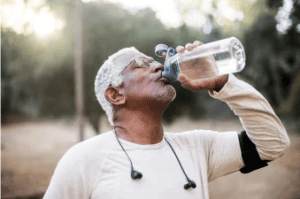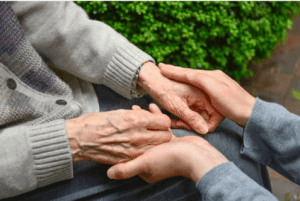Dehydration is the result of the body losing more water than it is taking in. Water is crucial for controlling bodily functions which include aiding in digestion, regulating bodily temperature, and managing organ function.
These are some factors that can be involved in a senior’s increased inclination to dehydration:
-As we age, our sense of determining our thirst may decrease, which will make it easier to ignore our bodies’ need for fluids.
-Senior kidneys may not concentrate urine properly, which will decrease kidney function.
-Many seniors are prescribed diuretics.
-Diabetes and dementia can alter fluid balance.
There are many physical effects of dehydration including the following:
-One of the first symptoms of dehydration is dry skin and a sticky mouth.
-Dehydration can lead to sleepiness and muscle weakness.
-Reduced water levels can lead to low blood pressure, which can cause dizziness.
-Urinary tract infections can be the result of urine that is too concentrated.
There are cognitive effects of dehydration including the following:
-Severe dehydration can alter cognition, which could lead to difficulty concentrating and confusion.
-Dehydration can affect your mood, which could lead to anxiety and depression.
There are some complications of dehydration in seniors:
-Kidney stones can develop and dehydration can also exacerbate the effects of heat and increased risk of heat exhaustion or heatstroke.
Prevention is important when talking to seniors about dehydration. They can follow these suggestions:
-They should drink plenty of water, even when they are not thirsty.
-Eat foods that are high in water content, including fruits and vegetables.
-Caffeine and alcohol should be consumed in moderation.
If you do become dehydrated, Healthline mentions that people can treat it. “Treating dehydration involves replacing lost fluids. You can work to prevent dehydration by making sure you regularly take in fluids throughout the day. This can include water, juices, broths, or foods with high water content.”
Conclusion
In conclusion, dehydration is a serious concern for seniors, affecting both physical and cognitive health. Since aging can reduce the body’s ability to recognize thirst and properly regulate fluids, hydration is essential. By drinking water regularly and consuming hydrating food, seniors can maintain better overall health and well-being. Preventing dehydration not only helps avoid complications like kidney stones and urinary tract infections but also supports energy levels, mental clarity, and mood stability. Staying informed and taking steps to stay hydrated can significantly improve quality of life and promote long-term health.






